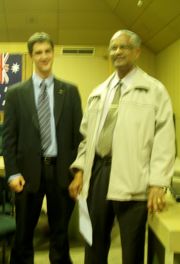There were a number of significant events that occurred over the past month and I would like to use this opportunity to brief both council and the wider community:
On the 20th of July the Eastern Transport Coalition, which consists of Melbourne’s seven eastern councils, organised a bus tour for Meredith Sussex the Coordinator-General of Infrastructure. Meredith is responsible for coordinating the areas of planning and transport on behalf of the State Government. Given the urban revitalisation and consolidation that is occurring in the eastern suburbs, it was imperative that Meredith saw the region firsthand to understand the issues facing the seven councils, including Maroondah.
As the Maroondah delegate on the Eastern Transport Coalition, I discussed the council’s vision for Maroondah, with a particular emphasis on the Ringwood Transit City and Croydon Activity Centre. We stressed the need for further bus improvements, particularly along main thoroughfares such as Maroondah Highway, Canterbury Road, Dorset and Wonga Roads to ensure that our community is provided with transport choice. We also highlighted the need for rail frequency improvements, where currently people must wait up to half an hour to catch a train between Ringwood and Croydon during a weekday, despite the fact that services are more frequent, with a twenty minute interval, on weekends.
We also discussed the need to upgrade Ringwood Station and for improvements along the pedestrian crossing at Maroondah Highway.
I will be tabling the factsheet compiled by Maroondah’s Sustainability Department, which explained Council’s direction and highlighted the issues requiring active involvement from the State Government.
The tour provided a welcomed opportunity to explore these issues firsthand and I would like to thank Meredith for her time.
On the 12th of August I attended a meeting organised by the Maroondah Climate Change Action Group and supported by Maroondah City Council. The meeting, which explored the issues surrounding climate change, was well attended and demonstrated the partnership that can exist between the community and council. I would like to take this opportunity to thank Maroondah’s Sustainability Department for providing logistical support for this function and hope that this will be the first of many instances of where we as a council support such groups in exploring environmental issues.
Lastly, on the 14th and 15th of August, as part of a delegation from the Eastern Transport Coalition, I flew to Canberra to discuss public transport issues with Federal Parliamentarians and to meet other stakeholder groups such as the Australasian Railways Association and the Australian Local Government Association.
Despite the dramas experienced at Melbourne Airport, where our 8.25 am flight did not depart until 11.10 am, the trip was extremely productive, once we finally arrived in Canberra.
Australia remains the only OECD nation, that is the only Westernised nation, where the Federal Government has no involvement in urban public transport. This is despite the recent Sustainable Cities Inquiry of 2005, which was based on a vision for Australian cities to be vibrant and healthy and concluded that a coordinated and concerted action plan, through leadership from the Federal Government, was currently missing in regard to our cities.
There is an economic, social and environmental case for Federal involvement in urban public transport and the ALGA motions brought forward in tonight’s agenda expand upon these elements.
In particular, however, is the issue of good governance and accountability and I would like to take this opportunity to clarify the stance of the Eastern Transport Coalition.
Cost-shifting from the State Government is a major source of frustration and increases costs to local government and our community. Since we experience this burden firsthand we are not about to try and shift State responsibilities to the Federal government. What we are calling for is Federal involvement to keep State Governments accountable. Federal involvement in urban public transport would help ensure that the State Government lives up to its pledge of improving public transport and finally delivers on previously made promises, such as the third track to Ringwood which was promised by the current State Labor Government since its election in 1999.
Federal leadership would further the infrastructure investment within our region and boost our the wellbeing of our community, the same way that the offer for matched federal funding for the then Scoresby Freeway ensured that it was on the State Government agenda.
The Eastern Transport Coalition is not about to shift costs and responsibilities to the Federal Government, what we are calling for is better governance and Federal leadership on this issue to ensure greater sustainability and the economic wellbeing of the eastern suburbs.
The trip to Canberra provided an opportunity to explore these issues with Parliamentarians and there is definite potential to explore suitable models for Federal leadership in creating Sustainable Cities. Federal leadership and involvement in such issues will ensure greater accountability and ensure that State Governments are not able to simply forget about their responsibilities for urban sustainability and public transport.
I will be tabling my written report that the trip to Canberra as well as the Eastern Transport Coalition’s report on the feasibility of federal funding for urban public transport.
